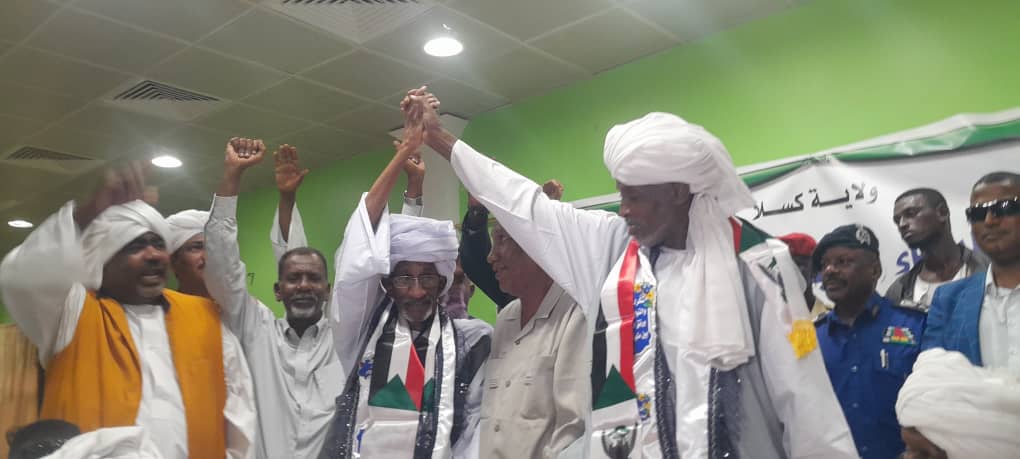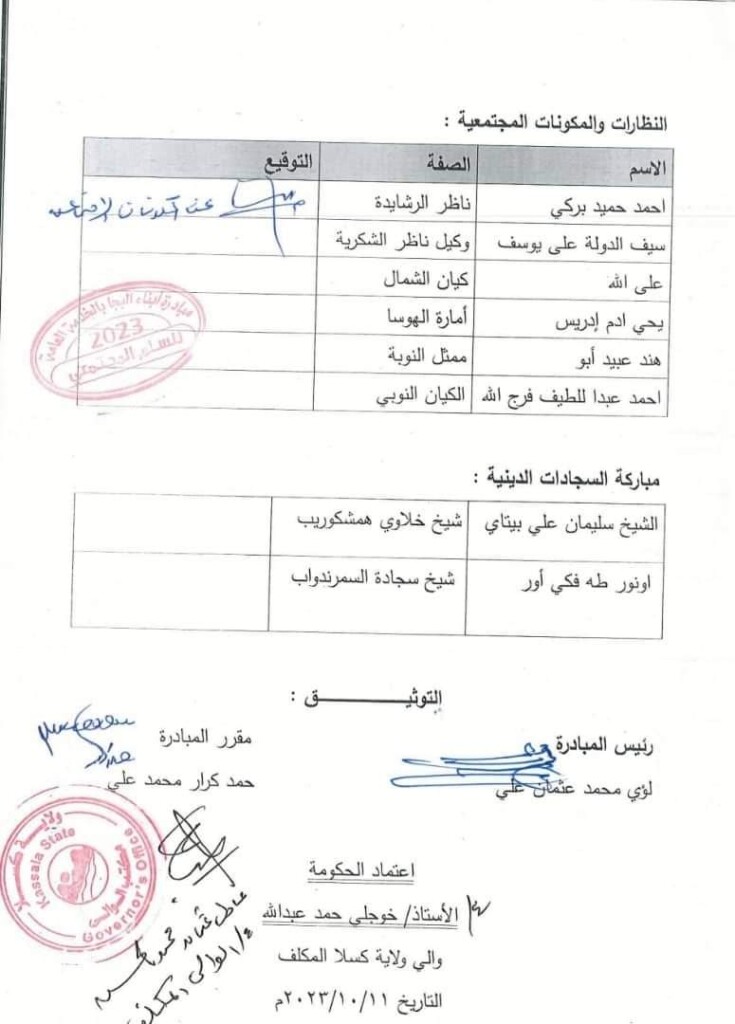Tribal leaders in eastern Sudan agree to ease tensions

Beja leaders after the signing of the El Galed agreement in Kassala on October 11 (Photo: social media)
Beja nazirs and tribal, religious and political leaders in eastern Sudan agreed on Wednesday to solve recent disputes in Kassala, renounce hate speech and hold an ‘inclusive conference’ for the region.
Disputes over mining areas in Rifi Kassala, south of the state capital, intensified last month as native administration leader* Nazir Sayed Tirik of the Beja Hadendowa refused to hand mining revenues from the area to the locality’s authorities, calling for separating the mining areas from the locality.
The El Galed agreement of Wednesday, based on customary reconciliation practices among the Beja, was initiated by prominent civil servants in Kassala.
The text confirms that localities in Sudan are state institutions, responsible for providing healthcare, education, and other services, and should “stay away from any tribal, ethnic, or political affiliations”. Land and border issues are to be adjudicated by means of official documents of the state institutions.
Political positions and alliances formed by native administration leaders, especially the nazirs, should be respected, “as long as they do not incite hatred and violence on various levels”. In case of disputes, it is up to the native administration system and the courts to settle them.
The parties also agreed to organise “an inclusive conference to discuss issues related to former political agreements, local governance, and rehabilitation of former combatants in eastern Sudan (Red Sea state, Kassala, and El Gedaref).
The agreement further underscored the importance of unity of the Beja tribe with its several clans, the cohesion of the communities in Kassala, the unity of Sudan, and the support of the Sudan Armed Forces.
Hadendowa Nazir Sayed Tirik, Beni Amer Nazir Ali Ibrahim Dagalol, Halanga Nazir Murad Shakilei, Rashaida Nazir Ahmed Baraki, Shukria Deputy Nazir Seifeldawla Ali, Hind Ubeid, representative of the Nuba tribes in Kassala, Ahmed Abdellatif, head of the Nuba Entity, Suleiman Bitay, sheikh of the Hameshkoreib Koran Schools, Onour Taha, sheikh of the Samarnadawab Sajada, acting Kassala Governor Khujali Hamed, and the head and the secretary of the initiative for the reconciliation session, signed the document.

Withheld
A number of native administration leaders and groups did not sign the Kassala agreement on Wednesday, including the nazirs of the Jamilab tribe, the United Beni Amer group, the Beni Amer Gathering, and the Habab Gathering.
The Jamilab leaders commented that the terms used in the agreement such as El Galed, a Beja custom, maps and political alliances, “are signs of an imminent conflict between the various components of the Beja tribe”.
In a statement on Thursday, they called for the exclusion of tribes and native administration leaders from politics “in order to preserve the social fabric and unity of eastern Sudan”.
Activist Khaled Nour, however, told Radio Dabanga that “this rare opportunity for an accord between civil society leaders should not be missed because of non-essential reservations”.
“All groups should provide reasonable comments on the agreement and support it,” he said. “The next step is to formulate tactical steps for the authorities so that the situation stabilises and new violent conflicts can be prevented”.
Eastern Sudan has witnessed violent conflicts over the past years following the signing by only two eastern Sudanese groups of the Eastern Sudan Track protocol on February 20, 2020, that was incorporated in the Juba Peace Agreement more than seven months later, and the appointment of former Kassala governor Saleh Ammar in July 2020.
Political activist Hamrour Hussein told Radio Dabanga that “the disputes between the Beja groups over the past couple of years concern political interests, not societal issues”. He called on the native administration leaders in Kassala to distance themselves from politics.
Hate speech
Activist Khaled Nour told Radio Dabanga that he considers the agreement “a positive step in light of the tensions in eastern Sudan”. He said that “the objection of some parties to the agreement was caused by the lack of adequate consultation”.
According to Nour, the most prominent feature of the accord is “the rejection of hate speech and the invocation of the law.
“The signatories agreed to combat hate speech and other negative ways of incitement, while stressing the state’s responsibility to activate laws, control them, and punish anyone who promotes societal hatred and rejects the other,” he explained.
* A nazir is a state-appointed administrative chief of a tribe, according to the native administration system in Sudan. The Native Administration was instituted by British colonial authorities seeking a pragmatic system of governance that allowed for effective control with limited oversight by the state. The three-tiered system of Sheikhs, Omdas, and Paramount Chiefs (Nazirs, Sultans, Meliks and Shartais) was built on customary governance that had previously helped resolve local disputes and manage access to natural resources. According to the Darfur Bar Association (DBA), the Native Administration during the 30-year rule of dictator Omar Al Bashir did not represent the real community leaders.











 and then
and then